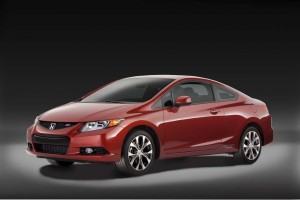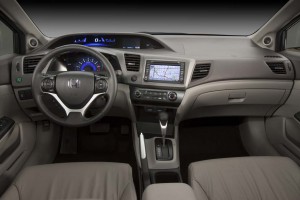Honda has made it officially official, lifting the covers on the 2012 Civic line, which now covers six different models, including the all-new Honda Civic HF.
But for those who saw the two thinly-disguised Civic concept models at the Detroit Auto Show, last month, there are few surprises. And that, say some skeptics, could be a big problem for Honda, which is going up against some tough new competition in the compact segment it – and Japanese rival Toyota – have long and overwhelmingly dominated.
Along with the standard-issue Civic Coupe and Sedan models, the 2012 line-up will include the sporty Civic Si, in both 2- and 4-door configuration, and the Civic Hybrid. While there’s no word on when the natural gas-powered Civic will be introduced, the compact mix will feature a new entry, the Honda Civic HF, short for high fuel-efficiency.
The HF will be powered by a 140-horsepower 1.8-liter i-VTEC engine, paired with a 5-speed automatic. It will also get the Honda EcoAssist system, a computer-controlled technology designed to tweak throttle response and shift times to maximize fuel efficiency. There will also be some body modifications to improve aerodynamic efficiency, with low rolling-resistance tires designed to further improve mileage – which is rated at 41 mpg Highway, or 1 mpg better than the stock 2011 Hyundai Elantra, which Honda will likely promote heavily in the marketing campaign for the new Civic.
The standard Civic Coupe and Sedan models will share the 1.8-liter i-VTEC, gearbox and EcoAssist, but are rated at 39 mpg Highway, an improvement of 3% over the outgoing Civic.
Other powertrain details haven’t been released regarding those models, though Honda says the new Si will get a modest 1.5% bump in horsepower, from 197 to 200, but a more substantial 22% increase in torque, which climbs to 170 lb-ft. The 2012 Civic Si engine will be 2.4-liter I-4 as in the Acura TSX, replacing the previous 2.0-liter.
As for the Civic Hybrid, it will deliver an extra 4 mpg over the HF, but it could take some creative pricing to justify the move, considering that for an owner driving 15,000 miles a year the gas-electric driveline would save a grand total of just 26 gallons of fuel annually. Even at $4 a gallon, the savings would total barely $100 a year, a difficult economic equation to justify.
The 2012 Civic Hybrid will be the first Honda to migrate from nickel-metal hydride to lithium batteries. But it will continue to use the Honda Integrated Motor Assist, or IMA, system, which means no driving in purely electric mode. The base gas engine, meanwhile, has been upgraded to 1.5 liters, so the entire driveline will now put out 110 hp. That could be another factor working against the Civic Hybrid as buyers consider the HF alternative.
Civic has been a powerhouse in the compact segment for years, but the concept vehicles shown in Detroit generated more questions than kudos, many observers wondering why Honda hadn’t come up with a more radical redesign, as it often had before. The maker reportedly had considered upsizing the 2012 Civic but may have feared the impact on fuel economy at a time when $4 and even $5 gas is becoming increasingly likely.
Nonetheless, the 2012 Honda Civic will face a much more challenging market than the previous generation compact. The new Hyundai Elantra has received significant praise and General Motors is building momentum with the new Chevrolet Cruze and high-mileage Cruze Eco. And Ford is expected to bring one of the most competitive models to market, later this year, in the form of a redesigned Focus.



Although I am not a fan of hybrids, just looking at the highway fuel economy is somewhat deceptive.
Hybrids historically shine in the city mpg number and are only slightly better in highway mpg’s than their equivalent gasoline versions. If one can compare historical real world numbers, a Civic hybrid should bring at least 45 mpg overall whereas a “normal” HF might get 32 mpg overall if the owner is careful in average driving. That would put it at around 50% better fuel economy and over a lifetime amount to a lot of $$$.
At $4/gallon and 15,000 miles per year, overall 32 mpg ($1875) might improve to 48 mpg ($1250) and would save $625 a year, enough to satisfy some eco-conscious buyers who might also not want to send any more oil dollars overseas than they have to.
As when often discussing diesels, no mention is made of the extra torque and performance the batteries give to the vehicle. I personally prefer the simplicity of a single power-train to that of the double engine complexity of a hybrid. Diesels tend to maintain a higher resale value than their similarly equipped gasoline versions.
I did enjoy my Math class. A bump of 197 to 200 hp is a 1.5% increase, not a 3% increase in power.
Ah, Peter, I have apparently let either my math or editing skills slip. Meant a 3 hp, not 3% bump, and will change copy to reflect that.
You also raise valid point in your analysis of highway v conventional mileage, though we’re both dancing around the edges. Unfortunately, Honda has not released the Combined mileage numbers for either version of the new Civic. I realize this is pulling a number out of the air, but an informed guess might suggest a 36 or 37 mpg (approx) number for the HF and perhaps 41 or 42 for the Hybrid. At 15,000 miles, that would work out to 357 gallons for the hybrid (at 42 mpg) and 416 gal annual consumption for the HF (at 36 mpg). In cash outlay, at $4/gal, we’re looking at $1428/year for the hybrid and $1664 for the HF, so the savings for the “average” driver would be a much more modest $236/year. For someone keeping the car five years, the difference would add up to a relatively modest $1180, and even if they could anticipate a higher trade-in value that makes for a difficult payback calculation.
To your point, someone who spends a LOT of time in city driving might be well off to consider a hybrid, as that’s where the benefits will be most pronounced. I agree that diesels have their advantages and are particularly positive (from a payback perspective) for those who do a lot of highway driving, where they really generate savings v a hybrid.
To that point, notice the new S-Class diesel is expected to get notably better mileage than the S-Class hybrid, though that’s food for another conversation.
Paul A. Eisenstein
Publisher, TheDetroitBureau.com
I do look forward to reading about the S-class Diesel specs if and when it gets to the States. Cheers.
Hi, Peter,
It’s coming. We posted the story from the Detroit Auto Show, last month.
Here’s the link:
http://www.thedetroitbureau.com/2011/01/first-look-2012-mercedes-benz-s350-bluetec-4matic/
Paul E.